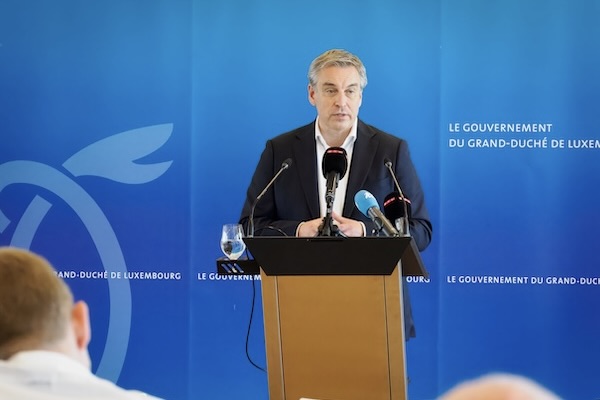 Claude Meisch, Luxembourg’s Minister of Housing and Spatial Planning;
Credit: MLOGAT/Olivier Pirrotte
Claude Meisch, Luxembourg’s Minister of Housing and Spatial Planning;
Credit: MLOGAT/Olivier Pirrotte
On Friday 4 July 2025, Luxembourg’s Minister of Housing and Spatial Planning, Claude Meisch, presented a draft law amending the Law of 30 July 2021 on the Housing Pact 2.0, alongside the publication of the first interim report on its implementation.
According to Luxembourg’s Ministry of Housing and Spatial Planning, since its launch in 2021, the Housing Pact 2.0 has played a central role in Luxembourg’s national housing policy. The pact aims to achieve three objectives: to increase the supply of affordable and sustainable housing at the municipal level; to mobilise existing land and housing potential; and to enhance residential quality in neighbourhoods.
The Housing Pact 2.0 sets out initial and implementation agreements between the State and municipalities. It also requires municipalities to develop a local housing action plan, with support from dedicated housing advisors who help put strategies into practice. So far, 98 municipalities have signed an initial agreement and 93 have already signed an implementation agreement.
The ministry reported that the new draft law introduces several improvements to the scheme in response to needs expressed by municipalities and their housing advisors. These include reduced bureaucracy and new incentives, combined with increased financial support.
Minister Meisch said: “This draft law adapts Housing Pact 2.0 to local realities. It gives municipalities the tools to respond to the specific needs of their residents while strengthening their key role in delivering affordable housing. It’s a practical, ambitious tool that empowers municipalities as central players in housing policy.”
One key simplification within the draft law removes previously imposed categories. Municipalities will now have the freedom to allocate the financial contributions received from the State to projects that meet the objectives of Housing Pact 2.0.
In addition, the government will introduce three new financial allocations. Municipalities will receive a one-off grant of €2,500:
- for each affordable housing unit acquired by the State within the municipality’s territory;
- for each unit planned in a special development plan (PAP) within a designated priority housing zone (ZPH) under the Sectoral Housing Plan;
- for each housing unit built in an undeveloped infill plot.
The ministry said that urban densification represents a strategic response to demographic growth. It allows for efficient use of existing infrastructure and encouraged the development of currently unused plots within built-up areas, before expanding into undeveloped zones. By tapping into these land reserves, municipalities can help create housing faster, without putting further pressure on infrastructure or upsetting the balance between built and natural spaces.
The development of ZPHs under the Sectoral Housing Plan supported housing in optimal locations while ensuring residents enjoy quality living conditions. The plan encouraged concentric urban development, the regeneration of industrial brownfield sites, and the creation of a mix of housing types. These additional financial measures will support the implementation of Luxembourg’s spatial planning objectives under Housing Pact 2.0.
The estimated budgetary impact of the draft law stands at €560 million for the period from 2027 to 2036.
The ministry also reported that Minister Meisch presented the interim report on the Housing Pact 2.0, which showed strong engagement from municipalities and significant momentum in the pact. The report reveals that housing advisors have delivered more than 40,800 hours of support to municipalities and the State has already allocated nearly €110 million since 2021.
The report also detailed that between 2021 and 2024, the number of homes managed under the Social Rental Management scheme rose from around 652 to 1,520. Meanwhile, the number of affordable rental units increased from roughly 2,000 to more than 4,000.
The ministry remarked that the proposed legal changes reflect a clear goal: to build more, build better and build faster - where it makes the most sense - thanks to the essential contribution of municipalities. The ministry remarked that “by boosting financial support and cutting red tape, the government and local authorities are working together to achieve balanced, sustainable development, particularly in the area of affordable housing”.
Minister Meisch reaffirmed: “Affordable housing remains a top national priority, and municipalities are at the heart of this collective solution. This draft law marks a major step in our shared commitment to provide everyone with access to quality housing at an affordable price.”








